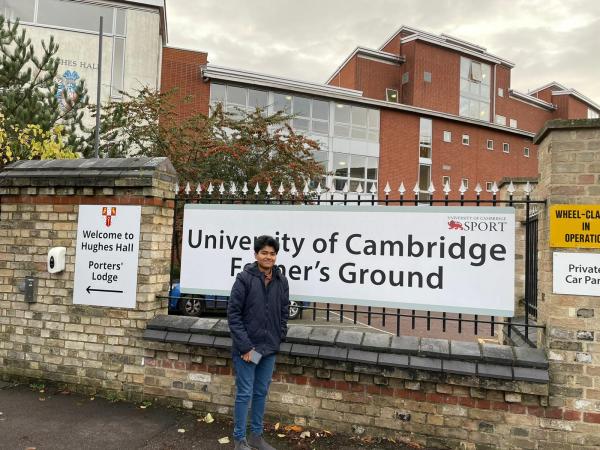Efforts in Youth Development of Bangladesh
Published 03/23/2023 in Scholar Travel Stipend
Written
by Jahin Rahman |
03/23/2023

I spent the first portion of my semester off in London. The primary purpose of my visit was for social work related to my nonprofit Efforts in Youth Development of Bangladesh (EYDB). I had grown up in Bangladesh until the age of 10. Throughout my life, I have seen the tremendous potential of many youth around me go to waste. A lot of kids that I was friends with in my childhood are now victims of child marriage and abuse. I have also seen the tremendous potential Bengali children possess and have been impressed by their drive to learn and adapt to situations. If these kids were given the kind of education that I am receiving, I cannot even fathom where they would be.
In high school, I founded an international NGO with multiple sectors in the U.S and Bangladesh to provide educational and developmental opportunities to orphan and street children of Bangladesh. My organization, EYDB, is currently providing thousands of Bangladeshi marginalized youth with the chance to pursue quality education through our education programs. EYDB is a completely student run organization, composed of approximately 200 student volunteers from NYC schools, as well as passionate teens from Dhaka.
In London, I was working towards garnering corporate sponsorship for one of EYDB’s projects. In the last couple of months, we are working on a project to eradicate menstrual hygiene in rural villages of Bangladesh. In many villages, the unavailability of proper menstrual hygiene products and lack of awareness has resulted in thousands of girls dropping out of school. Our project aims to install a social enterprise to ensure that this phenomenon no longer occurs. Last January, I visited Satkhira, a poverty-stricken village. We distribute a hundred reusable menstrual kits that could be reused for up to two years to girls, women, and female doctors in rural schools and community centers. We also provided surveys to each one of our recipients to document their experience. After two months, we are happy to announce that these kits were deemed helpful by 97% of our participants, many of whom also noted that they were able to go back to school and work as a result of receiving the kits.
We are working to distribute 500 more kits to the rural village of Satkhira. Simultaneously, our plan would be to buy 10 sewing machines and rent an office for the production of our own menstrual hygiene kits. We hope to employ financially struggling women from villages to sew our kits and sell them to individuals dropping out of school due to menstrual stigma at a small cost. Our ambition is to host workshops on various health topics and sponsoring the education of those in our program. In this manner, we will both be providing rural women a chance towards generating an income while addressing menstrual poverty and furthering education. In a village like Satkhira where there are no means of garment production and the poverty rate is too high for women to purchase commercial period products, our project will be revolutionary and change lives.
To reach our ambition, it is now critical that we secure funding for this innovative project. We are in need of $20,000 for the initial cost of buying 10 sewing machines, materials for our kits, rent, and our educational program.
I spent a month in London in order to achieve this goal. I was working with the Diana Foundation in London. I was put in communication with a mentor from the Foundation with whom I worked with throughout the month. My mentor, Peter, taught me courses in fundraising throughout my time in London. I met with fundraisers through field visits and learned about the fundamentals of garnering corporate sponsors for nonprofit projects. During one of our sessions in London, I was assisted in making a list of CSR contacts of potential organizations in the UK that would be willing to financially support our project. I spent a large part of my time researching and visiting these organizations. As well, I was able to meet with a number of prominent leaders and young activists in education from the community. I was invited to attend and speak at an educational event in Cambridge University. During the event, I met with faculty of the university, as well as young nonprofit founders who are doing revolutionary work in the education sector around the world. At the event, I gave a pitch of EYDB’s current project. I am still in the process of being in contact with organizations in London and pitching in order to gain corporate partnership. In conjunction with the Diana Foundation, I have been invited to co-create resources with Freezer, which is a ‘Work for Yourself Playbook’ that provides young social activists and entrepreneurs with expertise in setting up their own business/projects.
A key mission of the Milken Institute and the Milken Family Foundation is to support and empower others through effective strategies and education. Through the menstrual hygiene social enterprise, I hope to do that. Through our project, we hope to influence rural girls to stay in schools and complete their education by providing them with an essential tool for their health. Through my work with the Diana Foundation in my London trip, I have worked to promote the education and entrepreneurship pillars of the Milken Institution. Through educational community events, I spread the word about a social problem which many people in the West are not completely aware of. Working towards understanding fundraising efforts and submitting live pitches about our social enterprise helped me further the entrepreneurship pillar of Milken.
Overall, my trip to London re-energized me to do the social work that I do through my non-profit EYDB. In the next few months, I will be working towards securing grants and financial support for the educational projects that EYDB aims to do in Bangladesh.

